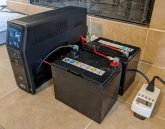Thanks, I had to assume that this was the way to go, but could not get that for sure from what I read. I understand your post also, it only makes sense. Having that said that, why have I not heard of anyone going with a higher voltage?
The inverters and charge controllers aren't so commonly available, at least for DIY.
Large UPS usually are - they just have high voltage strings of battery to power transistors directly driving the AC output.
Tesla PowerWall is high voltage.
Sunny Boy Storage uses 400V batteries. Up to three, 10 kWh batteries. Maybe 22 kWh are available now, last I looked.
So that might build a 66 kWh bank for you.
But for just 4800W, 20A 240V, that's in a range that lots of 48V inverters will support.
There are some 120/240V models (or if you're in the European market, 220V models)
Either one Sunny Island with a 120/240 transformer, drawing 100A from the battery, or two Sunny Island each drawing 50A from the battery. Well within their capability and it isn't that much current.
The only problem is lots of watt-hours, so many cells or large ones. The battery will either be made up of 2V lead-acid cells or 3.7V lithium cells. It doesn't really matter what voltage the inverter runs at, it's still the same number of cells. But if lithium, you need BMS to control each voltage, so lower voltage but more cells in parallel will be simpler.








